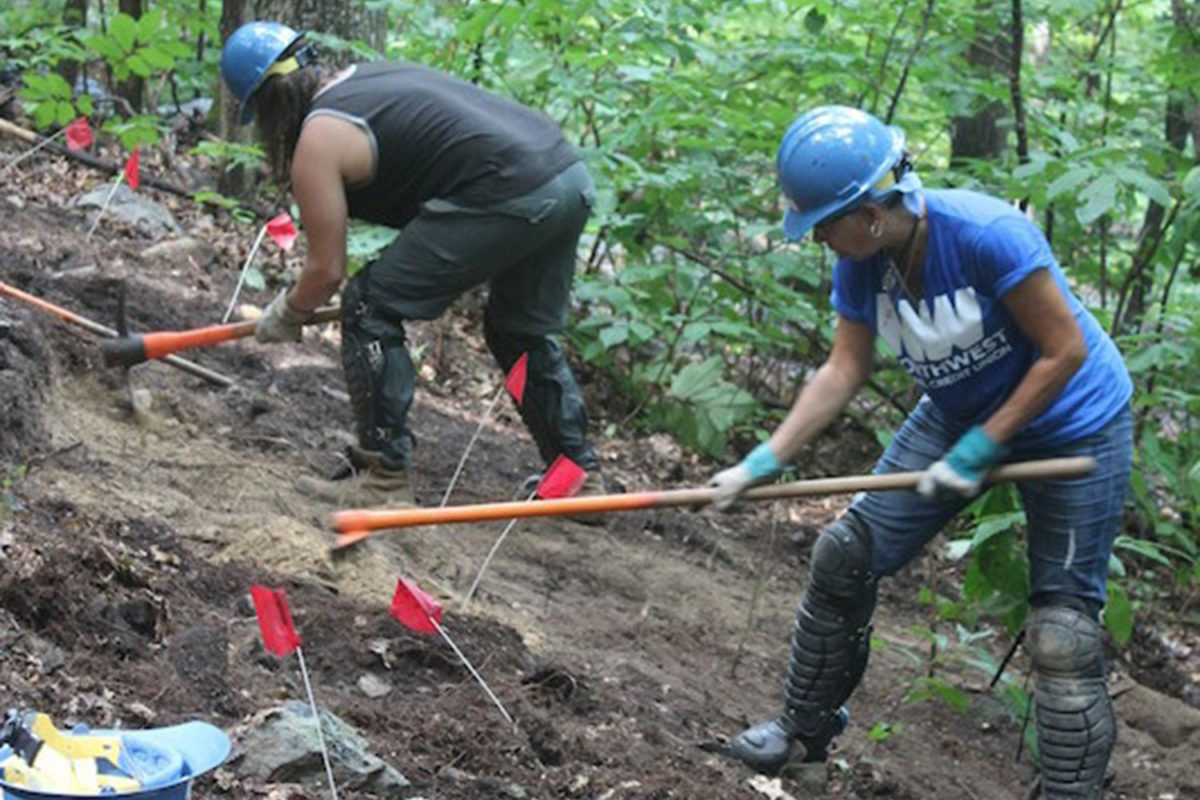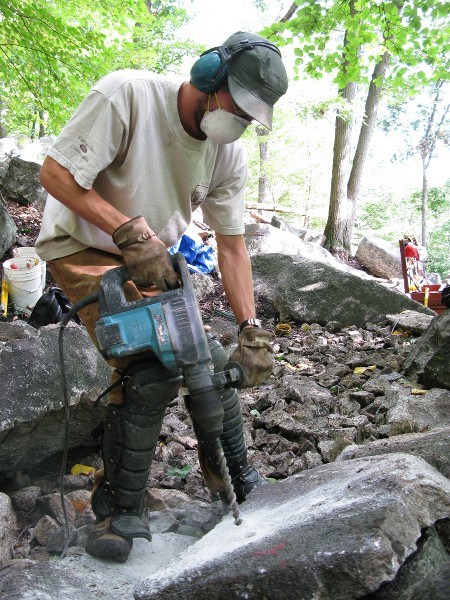Learn More
Mid-Atlantic Trail Crew
Based near Carlisle, Pennsylvania, the Mid-Atlantic Crew works on the Appalachian Trail from Rockfish Gap in Virginia to the New York–Connecticut state line. Sponsored by the National Park Service, the Appalachian Trail Conservancy, and the A.T. maintaining clubs of the mid-Atlantic region, it normally runs for eight weeks from late August to late October.

Base Camp
The crew base provides a meeting place for the crew on the day prior to the work week. It has a kitchen, dining/meeting hall, showers, bunk space, and parking for crew volunteer vehicles.

Crew Week
Crew members meet at base camp on the afternoon or evening of the day before the first day of their work week for dinner and an orientation session. The first day of the work week begins with a hearty breakfast at 7 a.m. followed by travel to the project. The remainder of the first day is spent on some combination of working on the project and setting up a field camp. The crew spends the next three days working on the project. On the final day of the work week, the schedule is reversed: field camp is packed up, some work may be done on the project, and the crew travels back to base camp. Tools, the field kitchen, and vehicles are cleaned, followed by an optional celebratory dinner. Volunteers for the next session may be able to stay at the base camp between sessions, with the exception of the mid-season break — please indicate whether you are interested in this while registering.
Please note that while there are usually three days off between each crew session, occasionally adjustments to that schedule must be made. Please contact us with any questions about the schedule.

Mid-Atlantic Schedule 2025
Session 1: Wind Gap A.T. Relocation
Wednesday, August 27 – Monday, September 1
The Crew will continue work on a relocation of the Appalachian Trail within the Cherry Valley National Wildlife Refuge near Wind Gap, Pennsylvania. This relocation will reduce the steepness of this section of the Trail, providing visitors with an improved experience today and into the future. This new route will have a more gradual grade, helping to prevent erosion by reducing the amount and speed of water that travels down the tread of the Trail. Constructing a new and more sustainable path for the Trail involves tasks such as vegetative clearing, tread definition, side hill tread construction, stone step installation, and crib wall construction. Each work day, the Crew will be hiking about 1/2 of a mile to the worksite with a climb of around 500 feet. The crew will be staying at a nearby A.T. hostel.
Session 2: Wind Gap A.T. Relocation
Thursday, September 4 – Tuesday, September 9
The Crew will continue work on a relocation of the Appalachian Trail within the Cherry Valley National Wildlife Refuge near Wind Gap, Pennsylvania. This relocation will reduce the steepness of this section of the Trail, providing visitors with an improved experience today and into the future. This new route will have a more gradual grade, helping to prevent erosion by reducing the amount and speed of water that travels down the tread of the Trail. Constructing a new and more sustainable path for the Trail involves tasks such as vegetative clearing, tread definition, side hill tread construction, stone step installation, and crib wall construction. Each work day, the Crew will be hiking about 1/2 of a mile to the worksite with a climb of around 500 feet. The crew will be staying at a nearby A.T. hostel.
Session 3: Clarks Ferry Switchback Rehabilitation
Friday, September 12 – Wednesday, September 17
The crew will work with the York Hiking Club on rebuilding a switchback at the bottom of the climb north from the Susquehanna River. Trail work tasks will include replacing a deteriorating log crib wall with milled lumber and re-establishing sidehill bench tread. This work will make the Trail more sustainable and enjoyable for all hikers! The crew will be tent camping about 30 minutes from the project site and commuting daily. The work site is a short walk from the parking area with a very brief climb.
Session 4: Clarks Ferry Switchback Rehabilitation
Saturday, September 20 – Thursday, September 25
The crew will work with the York Hiking Club on rebuilding a switchback at the bottom of the climb north from the Susquehanna River. Trail work tasks will include replacing a deteriorating log crib wall with milled lumber and re-establishing sidehill bench tread. This work will make the Trail more sustainable and enjoyable for hikers! The crew will be tent camping about 30 minutes from the project site and commuting daily. The work site is a short walk from the parking area with a very brief climb.
Session 5: PA 309 Step Repair
Wednesday, October 1 – Monday, October 6
The crew will begin working on replacing wood steps and digging a short sidehill relocation near PA 309 with volunteers from the Allentown Hiking Club, a local A.T. maintaining club. This project will make the Trail more sustainable and enjoyable for all hikers! The crew will be tent camping nearby and walking to the work site.
Session 6: PA 309 Step Repair
Thursday, October 9 – Tuesday, October 14
The crew will begin working on replacing wood steps and digging a short sidehill relocation near PA 309 with volunteers from the Allentown Hiking Club, a local A.T. maintaining club. This project will make the Trail more sustainable and enjoyable for hikers! The crew will be tent camping nearby and walking to the work site.
Session 7: Cumberland Valley Bridge Replacements
Friday, October 17 – Wednesday, October 22
The crew will continue working on replacing two pedestrian bridges on the A.T. near Carlisle, Pennsylvania. The work will involve tasks such as dismantling the old bridges, using a grip hoist system (a manual device that uses a wire rope to lift or pull heavy loads) to set in place the stringers for the bridges, and installing new decking and guard rails. The crew will be tent camping nearby.
Session 8: Cumberland Valley Bridge Replacements
Saturday, October 25 – Thursday, October 30
The crew will continue working on replacing two pedestrian bridges on the A.T. near Carlisle, Pennsylvania. The work will involve tasks such as dismantling the old bridges, using a grip hoist system (a manual device that uses a wire rope to lift or pull heavy loads) to set in place the stringers for the bridges, and installing new decking and guard rails. The crew will be tent camping nearby..
Contact us
Give us a call at (717) 258-5771 x203 or email bsickley@appalachiantrail.org with any questions.
